My third day with LFF saw a series of movies that could be whittled down to the broad yet resonant concept of home. Bidding farewell to a place which forms the psychic and genetic makeup of one’s identity can be as difficult as transitioning into the unfamiliar. Then there’s the truly frightening thought of realizing what has been your home doesn’t look much like home anymore.t “Home”, as a certain musician once sang, “is where I want to be. But I guess I’m already there.”
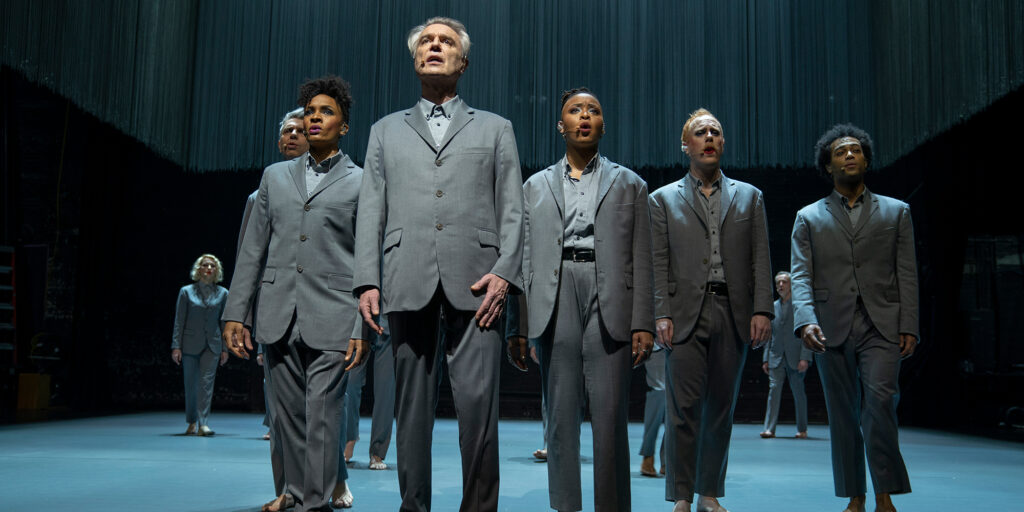
That musician stars at the center of what will likely be the most effusively joyful film playing at LFF this year, David Byrne’s American Utopia (4.5/5). The filmed performance of the eponymous Broadway show features Byrne and his band roaming the stage with the same playful energy displayed by Byrne’s other, more famous band in 1984’s Stop Making Sense. Jonathan Demme’s vision of the Talking Heads at the height of their popularity resulted in one of the incontestable masterpieces of the concert film, it’s shadow looming large over subsequent titles, including Demme’s superb Justin Timberlake + The Tennessee Kids from 2016. But director Spike Lee adopts several recognizable visual strategies, as well as songs, from Demme’s landmark classic to create a film that stands on its own as a harmonious melding of the artistic sensibilities and political convictions of both filmmaker and musician.
The film’s opening echoes Byrne’s iconic entrance in Stop Making Sense. This time, he isn’t holding a boom box and guitar but rather a human brain, pinpointing spots which form neural networks. Byrne’s interest in communal constructs built upon the information we process extends to a later rendition of I Should Watch TV where he and the band occupy separate parts of the stage, Byrne’s face poking through the lit curtains leading into the wings. Lee has devoted a long-standing interest toward a dialectic between media and spectators as it relates to America’s racial history. Byrne’s introduction of his fellow musicians onstage spotlights a multiculturalism that could be misconstrued as cultural appropriation. But what Byrne’s framework suggests and Lee’s roving camerawork affirms as it steers from one musician to the next is a construct built upon an influx of global musical influences. “Most of us are immigrants,” Byrne says of himself and his fellow musicians onstage, “and we couldn’t do without them.”
Byrne often addresses the audience between musical numbers, often to implicate them within his theoretical arguments. A visual demonstration involving a portion of the audience vividly elucidates the proportion of voters who traditionally partake in local elections. This invitation for communal participation in a show about “us and you” reiterates the maxim that democracy is not a spectator sport. Yet Lee doesn’t belabor this point, sparingly fixing his camera on an audience joined as much in a shared affection for Byrne’s music as for his political ideology. By and large, the stage remains the dominant focal point of American Utopia, a realm contained within a square that still provides what Byrne hopes is “liberating” for the performers. Angles shot overhead, close to the ground as bare feet leap and stomp, and even in handheld whip pans provide a dazzling array of spatial reconfigurations. In its dynamic framing of a cluster of people occupying a shared space, American Utopia is really not that dissimilar from Do the Right Thing, only further embracing the strain of theatricality within the everyday that Lee has made part of his signature.
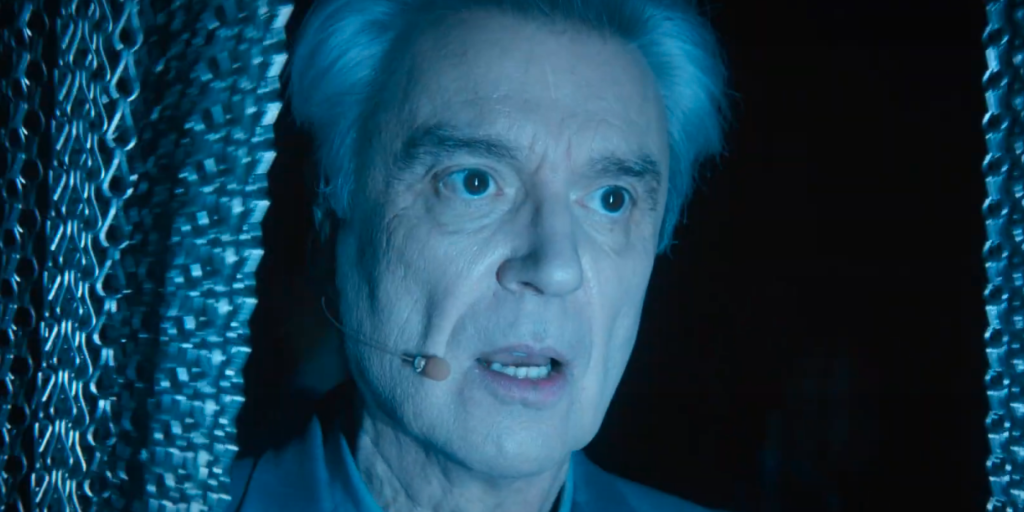
As buoyant a personality Byrne remains onstage, his genius as a performer is providing the semblance of a clear narrative. The early passages of mischievous invention give way to the ghostly march of dancers circling around Byrne as he holds a lamp post singing Bullet. It’s a nearly funereal sight, indicating the violent devastation which comes to the fore in the most confrontational moment of the film: a cover of Janelle Monáe’s Hell You Talmbout. The sequence crosscuts between the performance and track-ins to enlarged photographs of Eric Garner, Sandra Bland, and Trayvon Martin held by relatives. Lee’s Brechtian tendency to shine a light on those devastated by the consequences of racial violence finds a raw conduit here for voicing rage and sorrow. But as Byrne stresses, the number is as much a cry of defiance as it is one of mourning. The responsibility of artists in articulating that pain provides the ethos of American Utopia’s most deeply moving moment.
The poignancy of American Utopia lies in its gentle guidance toward facing seemingly insurmountable obstacles with a persistent, clear-eyed optimism. By singling out the subjective limits of artistic expression, the film recasts Walt Whitman’s urgent urgings for “boldly exposing the weakness, liabilities and infinite corruptions of democracy” as a means of salvaging it. That Byrne’s rendition of Everybody’s Coming to My House is teeming with anxiety does nothing to negate a “welcoming” air projected in a reprise sung by a children’s choir. Those dual strains of hope and despair, welcoming and rejection, love and hate provide the contradictory character of a divided nation. Maybe that’s why Road to Nowhere is such a fitting final performance, it’s doom-laden lyrics taken up by the entire auditorium in sheer exuberance. Together alone, we still strive for realizing the best this flawed social experiment we call America has to offer.
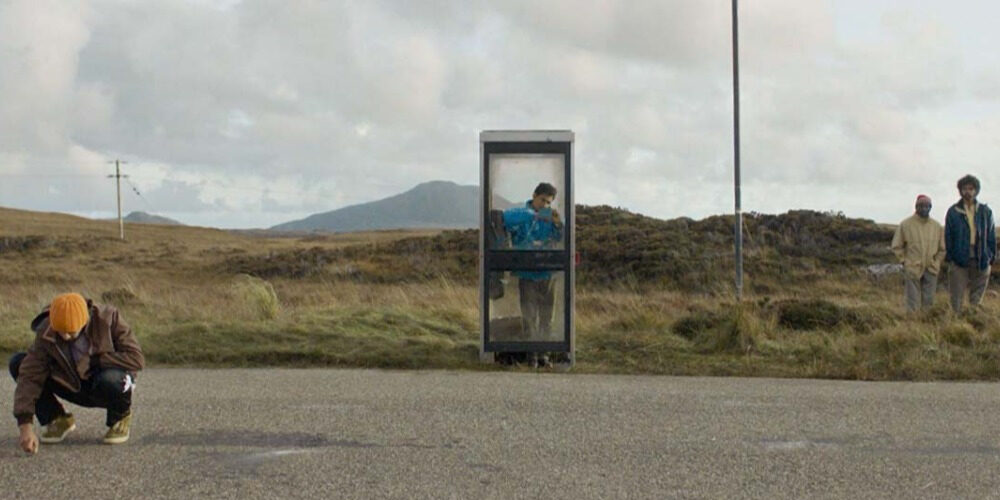
Branching out into different interrogations of national identity, two British films offered marked contrasts in their respective approaches toward portraying the modern immigrant experience in the United Kingdom. Limbo (3/5) tells its tale, about a group of refugees housed together on an island off the coast of Scotland, with a healthy helping of deadpan comedy. Omar (Amir El-Masry) trudges along, his oud tucked under his arm in its case, through the gray, windswept plains of the island with the hangdog features of Elia Suleiman. In fact, Suleiman’s eye for understated comic scenarios revolving around cultural alienation is evident in settings like the supermarket whose barren spice shelf has no sumac. More absurd still are the classes in “cultural awareness” taught by two hapless tutors whose inscrutably buffoonish attempts at elucidating social faux pas leaves the class only confused.
The film’s comic dynamics between characters extends to the house where Omar lives with three other refugees. Farhad (Vikash Bhai), the most gregarious of the group, models his physical appearance after fellow Zoroastrian Freddie Mercury, and offers to be Omar’s manager upon hearing of his musical performances from back home in Syria. Yet Omar’s inability to play the oud speaks to a deeper fear of losing a link to his cultural roots, an anxiety exacerbated by his parents’ financial struggles in Istanbul whilst his brother Nabil (Kais Nashif) fights with revolutionary forces in northern Syria.
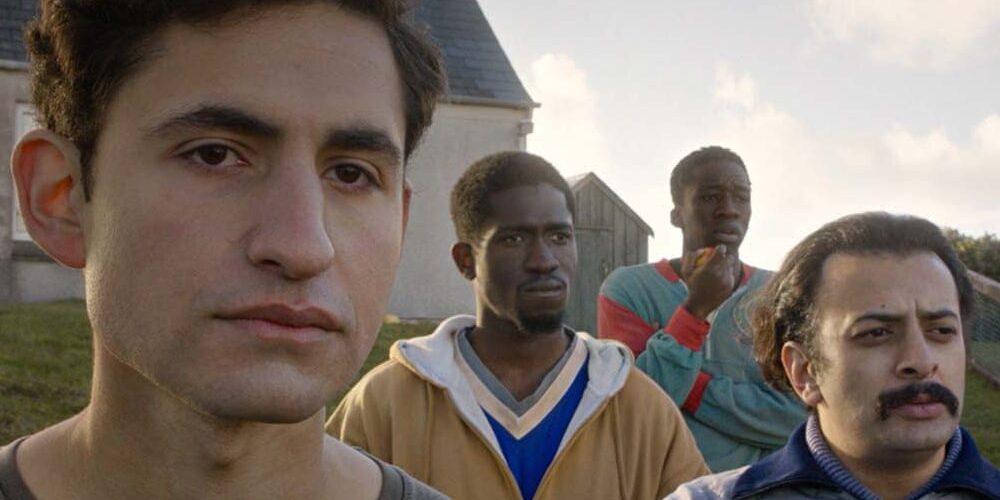
Limbo gradually dispenses with its comic tone as the gravity of the men’s collective situation becomes inescapable. The constant spats between the other two roommates, Abedi (Kwabena Ansah) and Wasef (Ola Orebiyi), foreshadow their growing desperation. DoP Nick Cooke’s Academy aspect ratio seamlessly bridges the film’s tonal shift with its alternately claustrophobic and expansive views of the island’s inhospitable natural terrain, it’s grey palette dotted with occasional reds and blues that subside as the story progresses. It’s in writer-director Ben Sharrock’s script that the film’s stabs at pathos betray a sentimental streak that’s often manipulative. Both Abedi and Wasef have only the barest part of their backstories expounded upon only to be jettisoned from the plot as little more than thematic sacrificial lambs. Wearisome still are motifs like a chicken coop whose likening to the plight of the refugees is practically banal.
Sharrock’s interest in exploring contemporary global issues, like the economic crisis in Spain in his previous film Pikadero, is a noble venture. But in it’s attempts to humanize its characters, Limbo veers perilously close toward appeasing a white, liberal audience. It’s intentions may be pure, but too often does Sharrock rely on jokes whose basic punch-line is that refugees are, believe it or not, just like us (they watch Friends! They enjoy karaoke!). The stories of so many still left floating in bureaucratic suspension can be deeply empathetic and funny. Yet despite its positive attributes, Limbo doesn’t quite strike that balance with successful specificity.
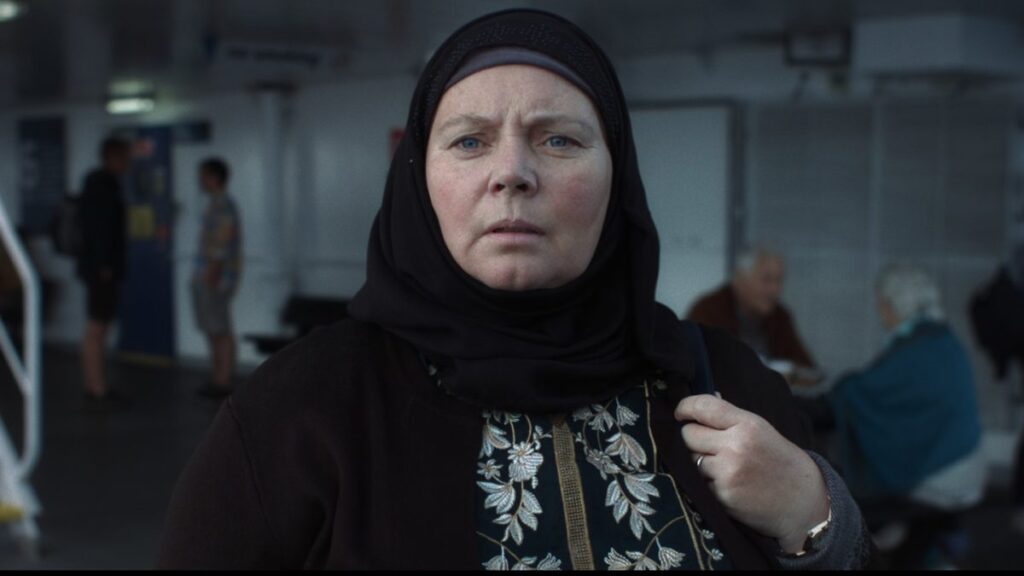
Faring better, albeit in a completely different emotional register, is After Love (4/5), the feature debut from Aleem Khan about a Muslim woman’s life following the sudden death of her husband. Mary Hussein (Joanna Scanlan) has spent years living a quiet life with her spouse, Ahmed (Nasser Memarzia), in Dover. Yet it is only after his passing that she discovers he has, in fact, led a secret life with another woman in Calais. She confronts the other woman, Génevieve (Nathalie Richard), only to withhold her identity and instead adopt the guise of a cleaning woman helping her with her forthcoming move. Mary ingratiates herself within the precarious dynamic between Génevieve and her adolescent son, Solomon (Talid Ariss), burrowing deeper into a lie she cannot sustain.
This entire scenario could have easily veered info lurid, sensationalistic territory. Yet the grief coursing through Mary after having devoted so much of her life to an unfaithful husband pervades the film’s aesthetic recurrence of white, from her funeral veil to the cliffs of Dover. The script by Khan also does not vilify the other characters, and it is Mary’s avoidance in telling Génevieve the father of her child has died that our sympathies become complicated. One moment where she texts Solomon from Ahmed’s phone threatens contrivance, yet Mary’s personal motivations are carefully weaved into the film so that a final twist, which may not come as a surprise to the attentive viewer, offers yet another wrinkle of heartbreak she and Ahmed experienced together.

Indeed, the tragedy coursing in After Love is not just the pain Ahmed has caused to both families but more so the irresolvable fact he will never be able to atone for that pain. “I made a sacrifice that no one else could,” Mary tells Génevieve on converting to Islam for her husband. But although Mary’s inaction worsens that sacrifice, Scanlan hardly plays Mary as a passive victim. Her attempt at fostering a relationship with Solomon allows her to impart several facets of his own cultural heritage his father failed to pass on, from talking about visiting Ahmed’s native Pakistan to showing Solomon how to eat saag with bread. The film’s naturalistic tone, occasionally offset by the obtrusive metaphor of a cracked, white surface (from a ceiling to a shifting cliff face), provides a compassionate view of how, as Génevieve puts it, “we all break the rules we set for ourselves knowingly, in the end.”
The ache of waiting for that which cannot return seeps into the film’s very topography. The English Channel itself provides a barrier as as well as passage where Mary awaited Ahmed’s return, his final voice message telling her to be careful not to fall over the cliff. Even their initial correspondence through cassette tapes as young lovers had both Mary and Ahmed remarking upon the moon to limit the distance between them. It is the transformation of these characters’ emotional purgatory that manifests in the changing geography, both in physical and national boundaries. If the film’s conclusion returns to this central thesis a little too neatly, that can be forgiven by virtue of the raw, sensitive performances Khan elicits from his small yet superb cast. With After Love, he’s announced his entry as an insightful humanist filmmaker and a talent well worth watching in the future.

Two other new promising filmmakers, Arie and Chuko Esiri, invert the purgatorial landscape of Limbo with their debut feature Eyimofe (This Is My Desire) (4/5), a diptych of tales concerning potential emigres in Lagos. The first sees Mofe (Jude Akuwudike), a factory technician, preparing to move with his sister Precious (Uzamere Amoyo) and her two sons to Spain. Yet a sudden tragedy brutally cuts short those plans and pits Mofe in a financial squabble over his sister’s holdings with their family. The second tale follows Rosa (Temiloluwa Ami-Williams) balancing jobs as a hair stylist and a bartender to eventually earn her and her younger sister Grace (Cynthia Ebijie) enough money to settle in Italy. Their options open up with a wealthy American named Peter (Jacob Alexander) wooing Rosa and an affluent yet unscrupulous woman named Mama Esther (Chioma Emeruah) offering to buy Grace’s baby.
The stories which form the script, written by Chuko, are often grim but never miserabilist. The film’s 16mm photography by DoP Arseni Khachaturan teems with a tactile warmth that complements the earthy browns and bright reds popping throughout Lagos. The city is observed with the same astute patience as the Taipei throughout the cinema of Edward Yang. Like Yang, Arie and Chuko utilize an urban landscape to provide a scathing, even angry critique of commodification as a determinant of human relationships. Upon being told Mofe must pay a discharge fee to collect the bodies of his sister and her children from the morgue, lest they be disposed of, a friend of his angrily cries, “What sort of cruelty is this?”
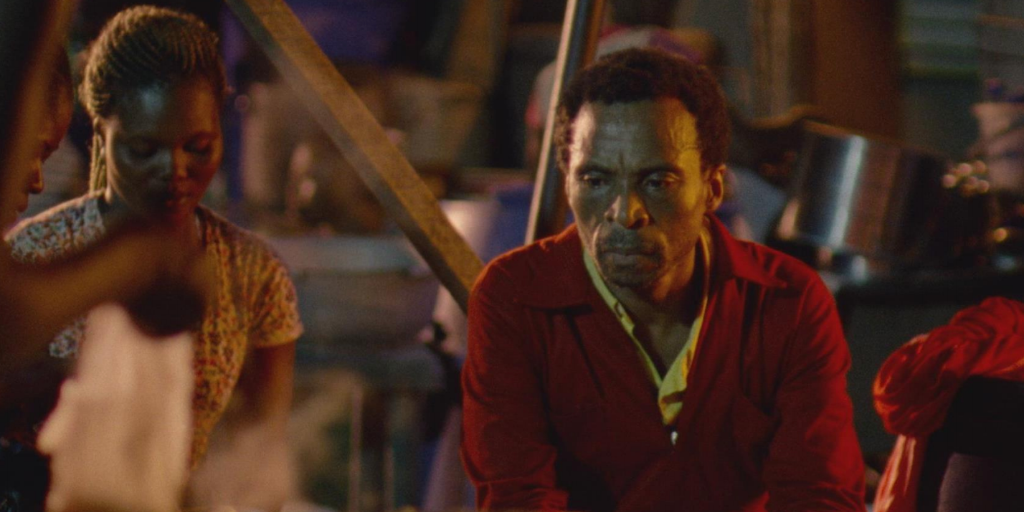
That cruelty borders on the Dickensian, particularly as we meet opportunists like Emeruah’s delightfully callous benefactor for Rosa and Grace, as well as their landlord Mr. Vincent (Toyin Oshinaike), whose feelings for Rosa are far from discreet. The cutthroat possessiveness of late capitalism is tempered by moments of genuine kinship, like Mofe’s mentorship of a young worker named Wisdom (Fortune Nwafor) and the bond between Rosa and Grace. These tender passages unfold organically, avoiding the pitfalls of saccharine melodrama even as the dual storylines occasionally intersect. While the measured, deliberate divulgence of diegetic information can make the characters’ relationships initially difficult to parse, the Esiris display an innate talent for visually materializing the emotions of their characters through their environments. A seemingly innocuous generator provides the source of tragedy, while a bead curtain hanging in front of a door provides as much privacy as it does entrapment.
The recent surge of Nigerian imports in the west have yielded a surfeit of filmmakers possessing cinephilic reflexivity, often applied to modernist fables like Abba Makama’s The Lost Okoroshi, which screened in LFF last year. Yet Eyimofe infuses its multiple transnational influences into a specific, precisely executed screenplay which affords its protagonists dignity and hope, even in the most seemingly dire circumstances. As clairvoyant surveyors of social hierarchies in their milieu, the Esiris have tremendous potential to become major figures in west African cinema.
Tomorrow:
Two portraits of inebriation from Thomas Vinterberg and the Ross Brothers. Plus a romantic fairy-tale by Christian Petzold.
